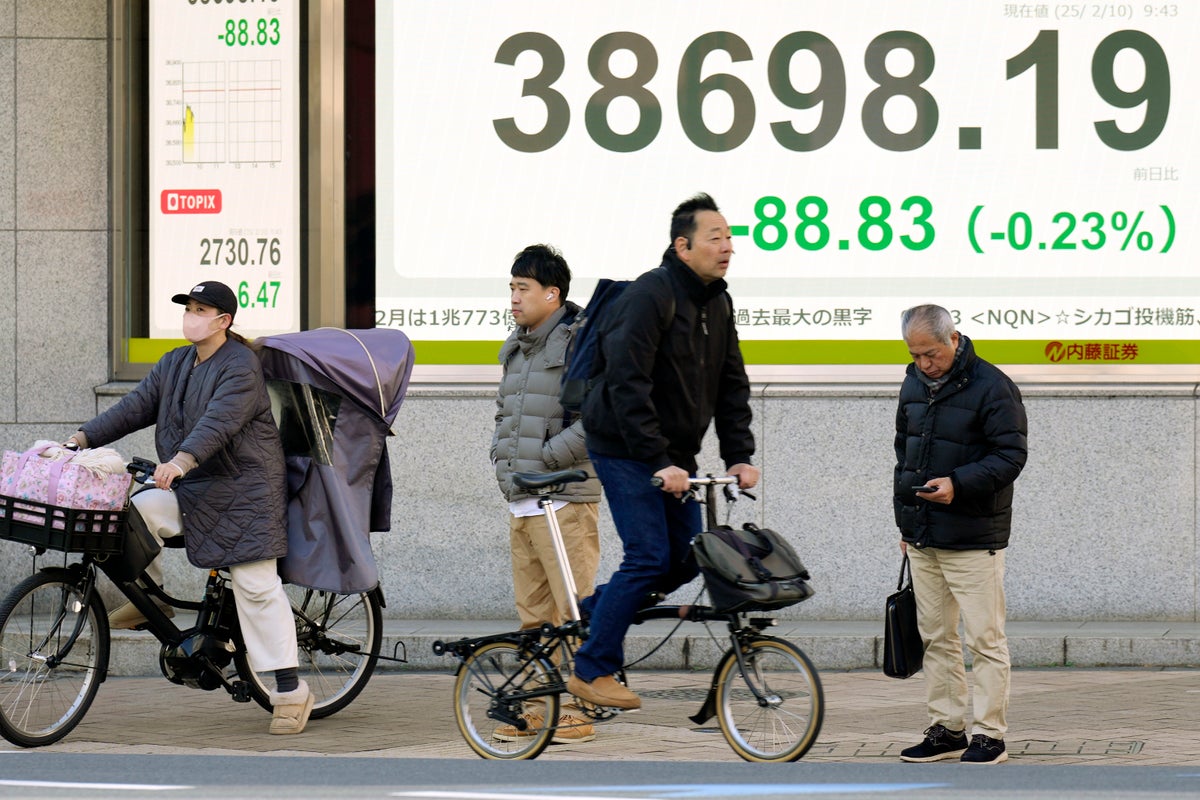
Asian shares were trading mixed on Monday, as investors found bargains despite worries about U.S. President Donald Trump's various tariffs.
Japan's benchmark Nikkei 225 shed 0.1% in early trading to 38,746.96. The Japanese government reported a record current account surplus last year of 29 trillion yen ($191 billion), underlining strong returns on overseas investments, boosted by a weak yen and recovering Japanese exports.
The current account data, seen as a wide indicator for trade, grew nearly 30% from the previous year, to its highest since comparable records started being kept in 1985.
In currency trading, the U.S. dollar rose to 152.11 Japanese yen from 151.39 yen. The euro cost $1.0304, down from $1.0328.
The Hang Seng index jumped 1.5% to 21,442.19, and the Shanghai Composite added 0.3% to 3,314.04, despite Trump’s tariffs on Chinese imports.
Technology shares were among the gainers, as hopes grew for Chinese stimulus measures. China is retaliating with tariffs on select American imports and has announced an antitrust investigation into Google.
Trump also said he would apply 25% tariffs on all steel and aluminum imports from all countries into the U.S.
Stephen Innes, managing partner at SPI Asset Management, believes markets are in for turbulence over the tariffs, noting Asian economies will feel the impact from the tariffs, including those on imports from Mexico and Canada.
Trump has given 30-day reprieves for tariffs on both Mexico and Canada.
“Asian markets are staring down the barrel of a volatile open,” he said, while noting some of the effects may have already been factored in.
South Korea's Kospi added 0.1% to 2,524.85. Australia's S&P/ASX 200 lost 0.4% to 8,479.30.
Wall Street ended last week with the S&P 500 falling 0.9%, although it remains near its record high set two weeks ago.
The Dow Jones Industrial Average sank 444 points, or 1%, and a sharp fall for Amazon after its latest profit report dragged the Nasdaq composite to a market-leading loss of 1.4%.
Treasury yields also climbed in the bond market after a discouraging report on Friday morning suggested sentiment is unexpectedly souring among U.S. consumers. The preliminary report from the University of Michigan said U.S. consumers are expecting inflation in the year ahead to hit 4.3%, the highest such forecast since 2023.
Expectations are growing that U.S. tariffs on a wide range of imported products that Trump has proposed could ultimately push up prices for U.S. consumers.
Markets are also watching for the latest earnings reports from U.S. and global companies.
In Japan, Honda Motor Co. and Nissan Motor Corp. both report earnings on Thursday, as speculation grows their ongoing talks to set up a joint holding company may unravel. Japanese media reports, all citing unidentified sources, sent both stocks gyrating over the past week.
Amazon, one of Wall Street’s most influential companies, topped analysts’ expectations for earnings at the end of 2024, but its stock nevertheless fell 4.1%. Investors focused instead on its forecast for upcoming revenue, which fell short of analysts’ expectations.
All told, the S&P 500 fell 57.58 points to 6,025.99. The Dow Jones Industrial Average dropped 444.23 to 44,303.40, and the Nasdaq composite sank 268.59 to 19,523.40.
In the bond market, the 10-year Treasury yield rose to 4.48% last Friday from 4.44% late Thursday. The two-year Treasury yield, which more closely tracks expectations for the Fed, rose more. It climbed to 4.28% from 4.22%.
In energy trading, benchmark U.S. crude added 44 cents to $71.44 a barrel. Brent crude, the international standard, rose 48 cents to $75.14 a barrel.
___
AP Business Writer Stan Choe contributed.







